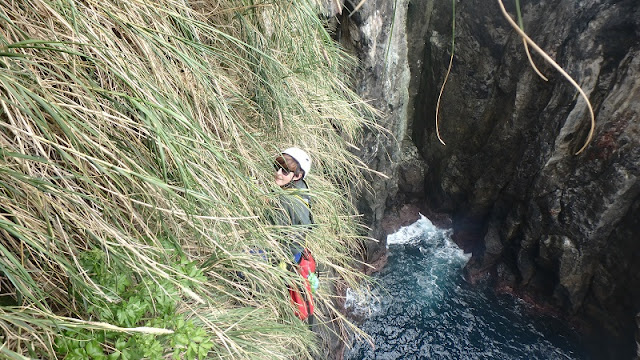A distinct lack of Albatrosses today... we thought it was about time for us to write about
the other, none-birdy side of our work. There is an invasive plant called Sagina procumbens on the island, and
there has been a project underway since 2000 to eradicate it.
 |
| A Sagina plant (David Kinchin-Smith) |
 |
| An infested area of bare earth (David Kinchin-Smith) |
On the mainland
Sagina is a small, harmless looking weed
but if it gains a foothold on remote islands it can take over, forming dense
mats through which nothing else can grow. It can fundamentally and irreversibly
change the biology of island ecosystems, so is potentially a huge threat to the
rare wildlife that calls Gough home. Because of this, a large chunk of our time
is spent spraying this insignificant looking plant with herbicide in the hope
of banishing it from this island. Its distribution has been limited to a 400m
stretch of coastline close to our base, but we are still hoping to completely
eradicate it. The area is divided into foot zones and rope drop areas, which we
access by abseiling down onto the sea cliffs.
 |
| One of the most exciting parts of our job- abseiling down sea-cliffs on the hunt for Sagina (David Kinchin-Smith) |
 |
| Snoekgat (Em Witcutt) |
 |
| Snoekgat- the worst affected foot zone (Em Witcutt) |
 |
| Looking back towards Snoekgat after a day of spraying (Em Witcutt) |
It's not all about removing plants with herbicide, we also have measures in place to prevent the spread of Sagina to other areas of the island. It can be carried on shoes and clothing, so we limit visits to infested areas for the whole team, and anyone visiting a Sagina zone has to wear specific clothing that is then never worn in any other part of the island. Newcomers to the island attend a 'boot washing ceremony' on the boat to prevent more seeds being brought here from elsewhere. We also have salt water foot baths at every entrance to the Base to be used by anyone staying on the island. Hopefully our efforts will pay
off, and we’ll leave this island with a little less of this troublesome plant
than there was when we arrived!
Em







No comments:
Post a Comment